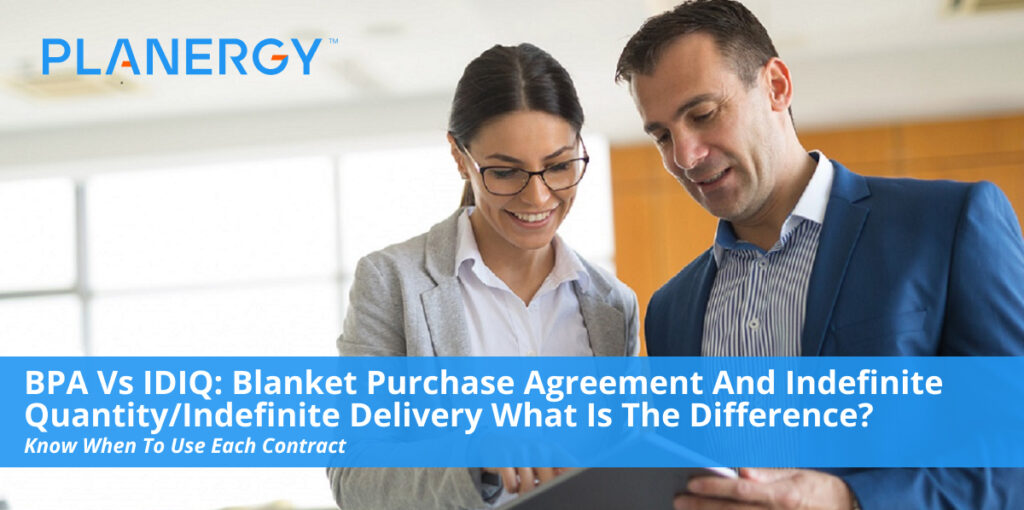BPA Vs IDIQ: Blanket Purchase Agreement And Indefinite Quantity/Indefinite Delivery What Is The Difference?
In today’s economy, there are nearly as many types of project contract out there as there are projects. You will always have customers that are used more frequently so certain contract types are better than others for your high volume or high frequency suppliers. These two are the IDIQ contract and the BPA contract.
The IDIQ Contract
The IDIQ contract is Indefinite delivery / indefinite quantity. Though the name does provide a bit of context and purpose around this kind of contract, the nuance goes a bit deeper. IDIQ contract are set for a fixed period of time. During that time, the contractor is responsible for an unlimited number of separate project and additional work on a current project.
The IDIQ contract format is commonly used in contracts with government agencies, particularly federal agencies. The amount of time covered in these contracts generally does not exceed five years however, it is common that they contain option years, which they can use to extend the contract if necessary.
With this type of contract, the government can retain technical expertise for an indefinite period of time which they can use in a number of areas such as repairs in construction, architectural design, engineering services, and electric work to name a few.
A simpler way to think of this is that the contract is designed in a way that you do not require deliverables for measurement. Goods or services are guaranteed for the duration, but they are only delivered if the need arises. Once the predetermined amount of time finishes, the contract will end unless it is extended, regardless of what has or has not been accomplished.
Using IDIQ contracts streamlines the contact process into a single large multi-year contract rather than hundreds of small contracts over the course of the project, thus reducing overall administrative costs. They allow agencies to have a specific list of companies they can work with on relatively short notice. That said, they do come with a certain amount of risk. If you agree to be the supplier of an IDIQ contract than you were liable to provide an unknown amount within limits for the duration of the contract. It is crucial that you make a detailed assessment before entering into this type of legal agreement because it could end up hurting you in the long run.
The BPA Contract
The BPA contract stands for blanket purchase agreement. The BPA contract establishes a working agreement between the contract holder and the contractor. This removes the need to establish additional contracts for every project or service as long as the specified but has not been reached or exceeded.
It is a simpler method of filling anticipated needs for open market goods and services below the simplified acquisition threshold, or SAT.
The SAT refers to the dollar value below which a non-federal entity may make purchases with small purchase methods.
A simpler way to think of this one is like a charge account that has been set up with trusted suppliers. Agencies and vendors like this type of setup because it helps reduce contract processing that is associated with repetitive purchasing. Once they are set up, repeat purchases become easier for both sides.
Buyers prepare these blanket purchase agreements without a purchase order only after they have contacted suppliers to make the necessary arrangements for periodic billing, securing maximum discounts, documenting the individual purchase transactions, and incorporating any other necessary details. This streamlines ordering procedures for both buyers and sellers.
Both these project contacts are useful in business. Choosing the one that fits best depends on whether the project is more concerned with money or timeframe.
IDIQ vs. BPA
Both contracts on the surface appear to be highly similar and do share a goal of reducing project overhead costs. However, there are some key differences between the two that affect how and when they need to be used.
When analyzing any contract, there are some key factors that determine the nature of a solid contract. The important ones in this case being the contractor term and contract budget.
Generally, multiple contracts across multiple projects ensures that both the terms and budget for said projects are controlled carefully. To avoid such an amount of work when it is unnecessary, control needs to be given up either in the terms of the contract term or the contract budget which is where the IDIQ and BPA contract formats differ.
When it comes to an IDIQ contract, the main deciding is the contract term. The term is controlled it fixed but the pricing isn’t which allows a project to scale up or down in relation to the budget.
On the other hand, a BPA contract focuses on the budget, but does not specify a term other than when the budget is depleted. This allows projects to scale in relation to time rather than budget.
When to Use These Contracts
Both IDIQ and BPA contracts require the contact holder to give up a certain level of control regarding the specifications of each service request. Because of this, they should only be used when working with a trusted contractor on Project that share similar or simple specifications. This ensures the contractor is more likely to receive the level of work they’re expecting despite the fact that there are no further details.
Because of the distinctions between time and budget, the contract can be tailored even more. For instance, a residential housing project except take place over 3 years. This situation requires many similar buildings to be instructed. If during the course of those three years, there was a chance of the project either incorporating more houses or reducing the total number of houses then an IDIQ contract would be the best suited because it fits within the time. It does not restrict budget changes.
On the other hand, if said project was given a fixed budget rather than a fixed time period, it makes more sense to use the BPA contract format.




